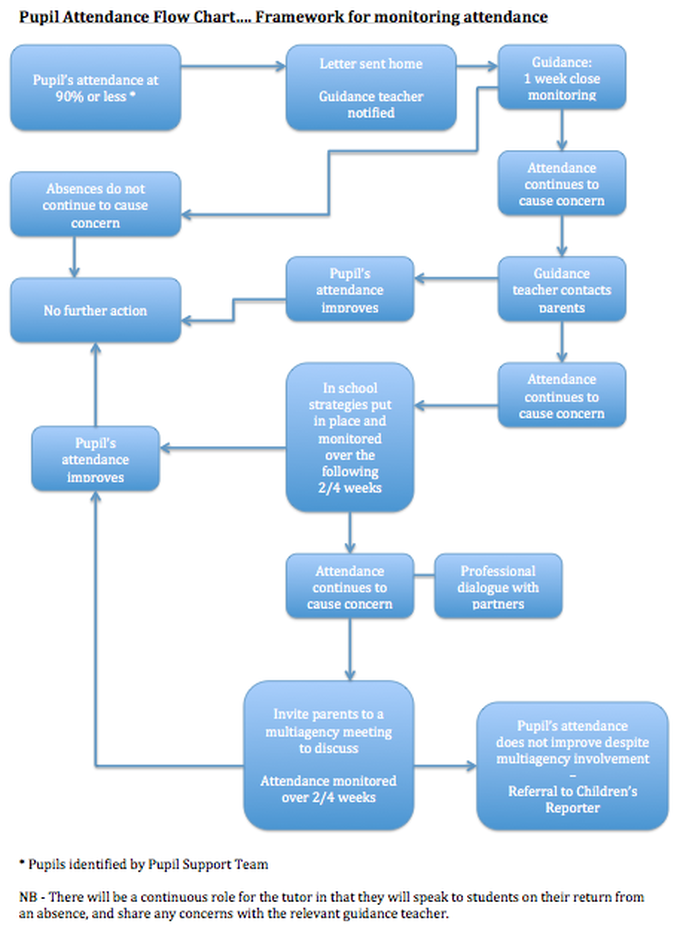Our Procedures and Guidance Letters
The purpose of this page is to share information about some of the roles of the KGS guidance department.
For information regarding KGS school polices please this link.
For information regarding KGS school polices please this link.
Attendance
| Attendance Policy - Parent Responsiblities |
Within the guidance department we monitor a pupil's attendance on a daily basis and follow the framework outlined below.
(Please don't hesitate to contact your son or daughter's guidance teacher if you have any questions.)
(Please don't hesitate to contact your son or daughter's guidance teacher if you have any questions.)
Child Plan
A Childs Plan is a working document used to help co-ordinate 'multi-agency' approaches. A Childs Plan can be used to record minutes of meetings, keep a chronology of significant events as well as create an action plan and targets to help a young person progress and meet their potential.
More information can be found via the following link
More information can be found via the following link
Reporting
Junior Phase (S1-3)
Parents have four official points of contact with the school each academic session;
1 x parents evening and 3 x tracking reports.
Senior Phase (S4-6)
Parents have four official points of contact with the school each academic session;
1 x parents evening and 3 x tracking reports.
Tracking reports are issued towards the end of each term and indicate academic progress.
Tracking reports operate a traffic light system - Red (Not Making Required Progress) and Green (Progressing as Expected)
Students are encouraged to have regular conversations about their tracking and targets with their class and guidance teachers.
Parents evenings usually run from 1700 - 1900 and dates can be found on the school calendar.
Parents evening appointments are made via an electronic booking system.
Parents are welcome to contact the school (via guidance) at any time to discuss their child's progress.
Parents have four official points of contact with the school each academic session;
1 x parents evening and 3 x tracking reports.
Senior Phase (S4-6)
Parents have four official points of contact with the school each academic session;
1 x parents evening and 3 x tracking reports.
Tracking reports are issued towards the end of each term and indicate academic progress.
Tracking reports operate a traffic light system - Red (Not Making Required Progress) and Green (Progressing as Expected)
Students are encouraged to have regular conversations about their tracking and targets with their class and guidance teachers.
Parents evenings usually run from 1700 - 1900 and dates can be found on the school calendar.
Parents evening appointments are made via an electronic booking system.
Parents are welcome to contact the school (via guidance) at any time to discuss their child's progress.
Bereavement
Coming soon...
Time out
We understand that there are times when everyone (and anyone) can feel stressed, upset or generally just feeling a bit overwhelmed.
We encourage any student feeling like this to come down to the guidance base to have a chat with their guidance teacher or Mrs Firth.
At KGS we follow the 'Time Out' procedure as outlined below:
We encourage any student feeling like this to come down to the guidance base to have a chat with their guidance teacher or Mrs Firth.
At KGS we follow the 'Time Out' procedure as outlined below:
- Student informs class teacher that they would like to 'time out'
- Student makes their way to the guidance base / Class teacher phones the guidance base to inform member of guidance that pupil is en route.
- Student and guidance teacher have a chat re: problem/concerns.
- Following this conversation, the student is given 10mins of 'time out'
- At the end of this 10mins the student returns to class
- If the student feels unable to return to class, they are given a space to remain in guidance/curriculum support for the remainder of the lesson.
- If the student feels unable to go to their next period class, the pupil is taken to 'Sick Bay' and parents are contacted as per 'Sick Bay' procedure.
In School Counselling
Here to listen, not to judge
Renate Andrews and Celia Clark are independent counsellors offering free and confidential counselling at school. This service is funded by Orkney Islands Council.
Counselling is a conversation with someone who is trained to listen and help you with issues such as stress, low mood, anger, bullying, relationship difficulties and self-harm. These sessions are 'person centred' and non-directive.
This conversation is private and confidential, and the counsellor is there to listen, not to judge.
Different ways that you can get the help and support of a counsellor:
Renate Andrews and Celia Clark are independent counsellors offering free and confidential counselling at school. This service is funded by Orkney Islands Council.
Counselling is a conversation with someone who is trained to listen and help you with issues such as stress, low mood, anger, bullying, relationship difficulties and self-harm. These sessions are 'person centred' and non-directive.
This conversation is private and confidential, and the counsellor is there to listen, not to judge.
Different ways that you can get the help and support of a counsellor:
- ask your Guidance teacher to arrange an appointment.
- write your name and mobile number on one of our cards and drop it in the secure box and we will collect it and arrange the appointment.
- send a text message to the mobile number given on the cards.
- ask someone you trust to get in touch through the school or by text or email (e.g a teacher, parent or friend).


